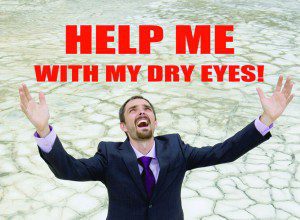“My eyes are scratchy, itchy, tearing and my vision is blurry.”
These are the complaints that we often hear from people with Dry Eye Disease.
 Exactly what is Dry Eye Disease?
Exactly what is Dry Eye Disease?
Dry Eyes occur when your tears are not sufficient to keep the front surface of the eye, your cornea, well lubricated. The cornea needs constant lubrication by good quality tears to stay healthy. Tears are made up of three components: an outer layer of oil, a middle layer of water, and an inner layer of mucus. If you do not produce enough tears, or if the composition of your tears is not balanced, your eyes will not be properly lubricated. The result may be blurry vision, stinging, scratchy, itchy eyes, and pain.
How can my eyes be dry when they tear so much?
Patients often feel their problem cannot be dry eyes, because their eyes overflow with tears. It seems odd, but watery eyes are sometimes part of Dry Eyes. Dr. Richard Hector, our Fellowship Trained Dry Eye Specialist explains, “When the cornea becomes too dry, tear glands over-stimulate the production of the watery component of your eye’s tears. Unfortunately, these reflex tears do not properly lubricate the eye, and may actually aggravate the problem.”
Common Causes of Dry Eye Syndrome
• Aging is the most common cause because tear production tends to diminish as you get older.
• Environment: Hot, dry, and windy weather; heaters, air conditioners and ceiling fans; and high altitudes increase the evaporation of tears.
• Electronic Use: Computer, phone, and tablet users have a tendency to “stare” at a screen for long periods without blinking, causing dry eyes in increasingly younger people.
• Poor Lid function: Problems with eyelids, such as out-turning of the lids (ectropion) or an in-turning of the lids (entropion) contribute to dry eyes.
• Contact Lenses: Long term contact lens wear can affect your tear production.
• Medical Conditions: Hormonal changes, especially in women, can cause problems with dryness. Also, patients suffering from thyroid disease, rheumatoid arthritis, psoriasis, eczema, Sjogren’s syndrome, lupus, scleroderma, and other systemic conditions often experience dry eye syndrome. In addition, blepharitis, an inflammation of the eyelids, may be a cause.
• Medications: Diuretics, allergy medication, antihistamines, and many other common medications may all produce dry eye symptoms.
• Smoking: Do you need still another reason to quit smoking? Recent studies have shown even second-hand smoke is harsh on the eye. There are a lot of toxic chemicals in cigarette smoke that can break down your protective tear film.
• Alcohol: Alcohol can dehydrate your eyes.
• Make-up: Waterproof eye make-up, mascara, and shadow can cause discomfort and sometimes a toxic reaction to dry eye sufferers.
• Eye Hygiene: It is important to maintain good, daily lid hygiene to manage chronic blepharitis, a common contributor to Dry Eye symptoms. Warm compresses help to lower the inflammatory oils & keeps your tear glands open.
What can be done about Dry Eye Disease?
Unfortunately Dry Eye Disease is usually a condition that cannot be cured, but it can be managed. The first approach to controlling mild Dry Eyes is by using over-the-counter artificial tears and ointments to lubricate the cornea and replenish natural tears. However, artificial tears only offer temporary symptom relief and do not address the underlying problem, which is often inflammation. A prescription eyedrop, Restasis™ can be prescribed to decrease inflammation.
Another common treatment is to place plugs in the upper and/or lower tear drainage canals to reduce the amount of tear drainage and help maintain better corneal lubrication.
And if you have tried these treatments with no relief, then Conjunctivochalasis (CCH) may be the problem. CCH is often mistaken for Dry Eye Disease. CCH occurs when the thin layer of tissue surrounding the white part of the eye begins to sag, causing redness and irritation. Fortunately, there are some great new treatments for this.
Tips for People with Dry Eyes
• Use artificial tears 3-4 times per day.
• Try different brands of artificial tears periodically. One may work better for you than another.
• At night, try a dry eye ointment/gel.
• Take a multivitamin with zinc and omega 3/fish oil or flaxseed oil daily. We are a big fan of the Omega Cure liquid product.
• Drink plenty of clear liquids.
• Protect your eyes with a UV protective coating on your everyday glasses as well as sunglasses.
• Always wear tinted lenses in the sun. “Wrap around” polarized sunglasses are especially effective.
• Keep your eyelids well moisturized at night with ‘bland’ moisturizers like Vaseline.
• Clean or replace air conditioner filter every month.
• When using electronics, take a break every 20 minutes and remember to BLINK.
The only way to know the best treatment option for you is to make an appointment for a dry eye evaluation. Call toll free 1-866-865-2020 for an appointment with one of our Dry Eye Specialists at The Eye Associates.
Richard E. Hector, MD
Robert S. Friedman, MD
Cathleen McCabe, MD
Brian Foster, MD
Scott B. Han, OD
Michael D. Camp, OD
Edwin Detweiler III, OD
Mary Jo Baize, OD
Lori Ann Long, OD
Toll Free: 1-866-865-2020
www.Sight4Life.com
WEST BRADENTON:
6002 Pointe West Blvd
(1 block south of Blake Medical Center
off 59th St West)
EAST BRADENTON:
7230 55th Avenue East
(12 Oaks Plaza at SR 70 & I-75)
ELLENTON:
7915 US Hwy 301 North, # 101
(Harris Professional Center,
corner Hwy 301 N & 80th Ave E)
SARASOTA:
2111 Bee Ridge Road
(South of Southgate Mall off US 41)
SUN CITY CENTER:
3894 Sun City Blvd
(on SR 674 across from Burger King)
WEST BRADENTON:
Dermatology & Hearing only
2101 61st Street West









